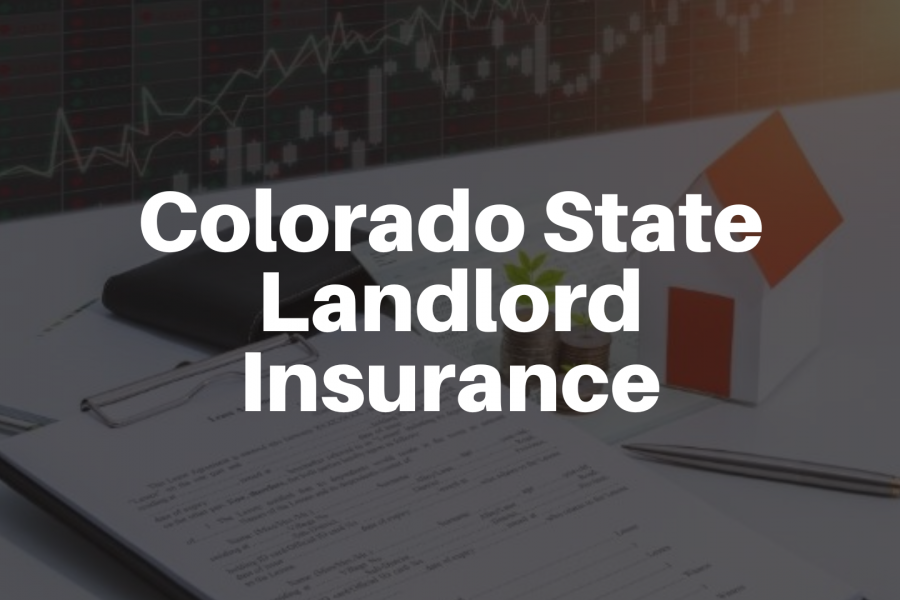Colorado State Landlord Insurance

- What Is Colorado Landlord Insurance?
- Is There Any Difference Between Landlord Insurance And Homeowners Insurance?
- What Does Landlord Insurance Cover In Colorado?
- What Isn’t Covered Under The Colorado Landlord Insurance?
- What Are Examples Of Risks That Landlord Insurance Can Cover?
- How Much Does Landlord Insurance Cost?
- How Can A Landlord Save Money When Shopping For Landlord Insurance Cover?
- Conclusion
Over the years, Colorado has consistently ranked as one of the best places to live in the country. It comes as no surprise that many people, from renters to property owners, enjoy calling it home.
But, while renting out a house in Colorado can be lucrative, it won’t see success without the proper protection. You’ll want to keep it safe against issues like water, fire, ice, and wind, which have the potential to cause serious damage. Fortunately, Colorado state landlord insurance can help you do just that!
The following is a basic overview of what to know about Colorado state landlord insurance.
What Is Colorado Landlord Insurance?
Landlord insurance only applies to property owners who rent out their properties. And much like a standard homeowner’s insurance cover, it covers risks associated with the rental property, including dwelling insurance, personal property coverage, and replacement cost coverage.
Colorado landlord-tenant law doesn’t obligate landlords to take out this type of policy. However, most mortgage lenders require landlords to have it as a prerequisite for loan approval.
Is There Any Difference Between Landlord Insurance And Homeowners Insurance?
A couple of differences exist between landlord insurance and traditional homeowners insurance. For one, landlord insurance is designed for rental properties, whereas homeowners insurance is designed for owner-occupied properties.
Secondly, landlord insurance only covers incidents directly related to your rental property. Homeowners insurance, on the other hand, covers bodily injury liability claims, being claims involving third parties.
What Does Landlord Insurance Cover In Colorado?
Generally speaking, landlord insurance usually covers the following things.
- Property coverage covers physical damage, which can be caused by things like storms, fire, or vandalism.
- Legal expenses or medical bills that you may be liable for if a person is injured on your property.
- Damage to your personal property, such as a lawnmower or other tools.
In addition to these, you may also be able to add other extras as well. For instance, you can choose to add loss of rental income protection. This will ensure you continue earning the rental income if a covered event prevents you from renting it out.

What Isn’t Covered Under Colorado Landlord Insurance?
When you take out a Colorado landlord insurance policy, it won’t cover your tenant’s personal belongings. The tenant will need to take out their own insurance policy known as renter’s insurance. Their policy will help cover the tenant’s personal property, offer liability coverage, as well as cover costs like hotel bills if the rental unit becomes uninhabitable due to a covered event.
Landlord insurance will also not cover appliance or equipment maintenance. It also won’t pay for the replacement of any items that deteriorate due to normal wear and tear. Make sure to inspect the unit regularly and respond to issues promptly. This will help in the identification and repair of issues before they become serious and costly.
It’s also important to note that landlord insurance will not cover any intentional damage. In this case, you’ll need to sue the tenant for the damages.
What Risks Does Colorado Landlord Insurance Cover?
As a landlord, the following are examples of situations where a landlord insurance cover can protect you.
Building Damage Caused By Severe Weather Conditions
Colorado winters, for instance, can be brutal, with freezing temperatures and heavy snowfall. And if you haven’t taken any necessary precautions, your property may suffer some serious damage.
Water pipes can freeze and burst, leading to water damage. Foundation cracks can develop as a result of freezing and thawing of the ground. Heavy snowfall can also cause roof overload, leading to eventual collapse.

Liability Damage Caused By Someone Getting Injured While On The Property
This is especially true if the injury is a result of negligence of the building. For example, things like poor lighting, slippery floors, inadequate security, or broken stairs or railings.
As you already know, it's the responsibility of property owners to keep their property habitable. As such, you could be held liable for any dangerous condition on the property that leads to an injury at your property.
Any Damage That Makes The Unit Unlivable
Any emergencies or damage that causes the unit to become unlivable is covered under landlord insurance. This can include things like flooding, wildfires, or avalanches.
The policy can also cover any lost rental income resulting from such natural disasters. Check the policy to verify whether lost rental income is a covered event or not.
Damage Caused To Items On Or Inside Of Your Property
A landlord insurance policy will also cover any personal property you have on or inside the rental property. This can include things like large furniture and appliances.
How Much Does Landlord Insurance Cost?
Knowing how much a landlord insurance policy will cost can be a bit tricky, and can depend on the insurance provider. Why? To calculate the cost of landlord insurance, agents have to factor in several factors. Including:
- Location of the building. A property located in natural disaster risks, high crime rates, or those with high property values will usually attract hefty premiums.
- Size and type of your rental property. Of course, the larger your investment is, the higher the premium is going to be.
- Condition of the property. If your property is older or poorly maintained, the riskier it’ll be and the higher the premiums will be.
- Number of tenants. The more the tenants are, the higher the risk of damage, and the higher the premium will be.
With that in mind, the average Colorado state landlord insurance is about $170 a month. This sums up to just over $2,000.

How Can A Landlord Save Money When Shopping For Landlord Insurance Cover?
The following are some ways that can positively affect your insurance premiums.
- Bundle all your policies together.
- Pay annually.
- Up your property’s security by installing security features, such as smoke detection and fire alarms.
- Screen prospective tenants to reduce the risk of accepting difficult renters.
Conclusion
Whereas landlord insurance in Colorado isn’t required per the law, it is key! It’ll provide you the much-needed peace of mind against a myriad of potential perils that your property can be exposed to.
If you have a question or want to get in contact with a property management service expert, contact Evolve Real Estate and Property Management. We provide full-service brokerage in Denver and the surrounding areas. Get in touch to learn more!
